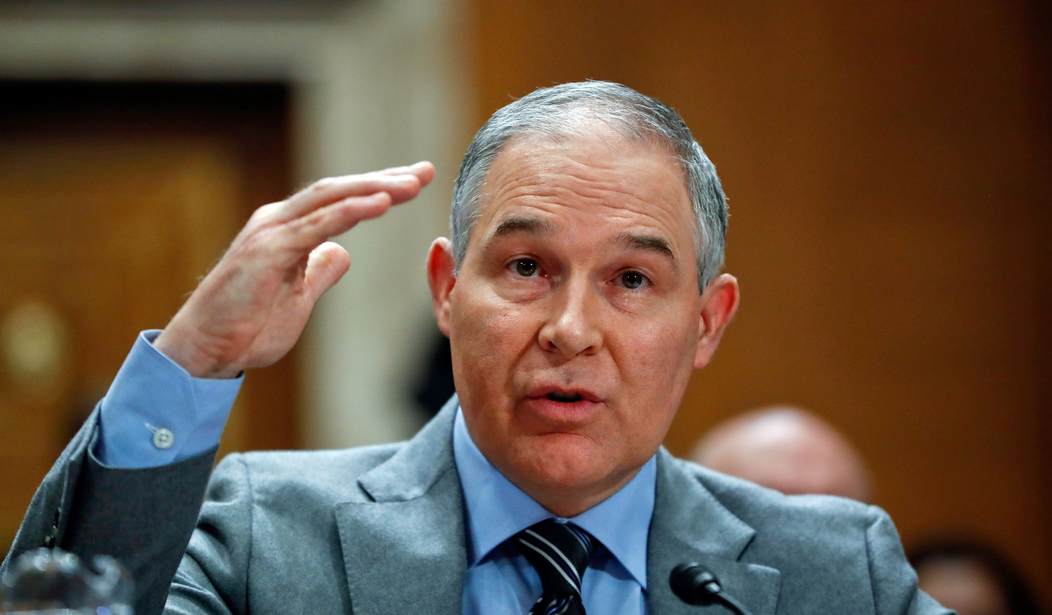On April 2, Environmental Protection Agency (EPA) Administrator Scott Pruitt announced the EPA will revoke Obama-era standards that mandate auto manufacturers achieve a fleet average of at least 50 miles per gallon on cars and light duty trucks sold in the United States by 2025.
Unlike most of the actions made by previous EPA administrators, Pruitt’s move will save countless lives and uphold consumer freedom.
EPA approved the current emissions standards in December 2016, just days before President Barack Obama left office and two years ahead of schedule. Under Obama’s direction, EPA arbitrarily decided fuel-economy standards should prevail over any concerns drivers may have when choosing their vehicles.
In the press release announcing EPA’s action, Pruitt said the Obama administration had short-circuited the process for setting fuel-economy standards for political reasons. “The Obama administration’s determination was wrong,” Pruitt wrote. “Obama’s EPA cut the Midterm Evaluation process short with politically charged expediency, made assumptions about the standards that didn’t comport with reality, and set the standards too high.”
Pruitt said EPA would work with the National Highway Traffic Safety Administration to establish a new standard that “allows auto manufacturers to make cars that people both want and can afford—while still expanding environmental and safety benefits of newer cars.”
Fuel standard mandates began in 1975, when Congress established Corporate Average Fuel Economy (CAFE) standards to reduce dependence on foreign oil following the 1973–74 Arab oil embargo. The initial law required car manufacturers to meet mandated fuel-economy targets or else pay a hefty tax on gas-guzzling sedans. What happened? Many people bought smaller, more fuel-efficient cars. Others, however, started driving trucks, and new categories of vehicles were born: SUVs and minivans.
Recommended
Over the years, compact cars have become less popular because of low fuel prices, underpowered engines, and lack of passenger and storage space. Most full-sized cars and trucks, by contrast, can seat five adults, and minivans and many SUVs can seat between seven and nine people. Most SUVs, trucks, and minivans offer ample cargo space and are capable of hauling a trailer or boat, which no subcompact can do safely.
Ironically, the high popularity of trucks, SUVs, and minivans is at least partially a result of environmentalists’ efforts to reduce the appeal of large, powerful cars. EPA’s stringent fuel-economy standards didn’t apply to trucks, or SUVs and minivans, which didn’t then exist. Hence, to keep the features they liked, millions of people replaced the family sedan or station wagon with an SUV or truck. As fuel efficiency increased and driving became cheaper, people drove more miles—thereby negating the marginal gains of owning more-fuel-efficient vehicles.
Although CAFE standards did not reduce America’s dependence on foreign oil—it would take the fracking revolution to do that—they did have other unintended consequences. After the implementation of CAFE standards, carmakers had to increase their fuel-economy guidelines to stay in business. How did they achieve this? By shedding vehicle weight.
Unfortunately, the vehicle-size and weight reductions made to meet CAFE standards have resulted in tens of thousands of unnecessary vehicle crash fatalities. For every 100 pounds shaved off new cars to meet CAFE standards, between 440 and 780 additional people are killed in auto accidents, amounting to 2,200 to 3,900 lives lost per model year, according to researchers at Harvard University and the Brookings Institution.
The laws of physics will never change. In a vehicle crash, larger and heavier is safer than lighter and smaller. Apparently, the Obama administration valued climate change dogma over vehicle safety.
In a frivolous attempt to influence the weather 100 years from now, Obama forced automakers, some of whom had recently received a government bailout, to endure even higher fuel-economy standards. However, even if one believes humans are affecting the climate, the National Academy of Sciences (NAS) found shifting to more-fuel-efficient cars will not slow purported global warming.
According to NAS, higher CAFE standards shifts greenhouse gas emissions from the tailpipe to the factory, because vehicles using lighter-weight materials require more energy consumption for the production of substitute materials. This alone offsets any decreases of greenhouse gas emissions that might be achieved because of fuel-efficiency standards.
There are plenty of fuel-efficient cars available for those whom fuel economy is the most important factor when choosing personal transportation. Pruitt’s action won’t change this. However, if a consumer prefers safety, comfort, power, and the ability to haul a trailer or ferry a little league team to a game, the government will no longer stifle these desires.
America, more than any other nation, possesses a deeply rooted car culture. We love our cars. We love hitting the open road. Finally, it seems we are free to do so again in any vehicle we choose to. Thank you, Administrator Pruitt.

























Join the conversation as a VIP Member